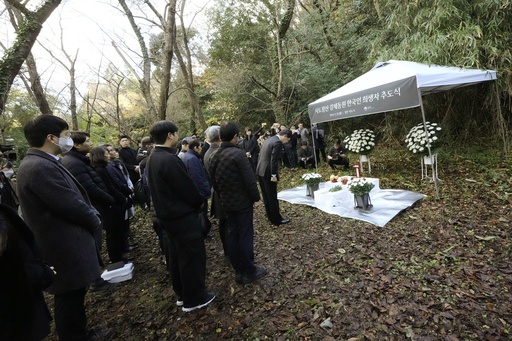
SADO, Japan — On Monday, South Korea held a memorial ceremony for Korean forced laborers at the historical Sado Island Gold Mines, just a day after opting out of a similar event organized by Japan. This gesture highlights ongoing tensions stemming from historical grievances that continue to influence relations between the two countries.
The ceremony took place at a former dormitory near the Sado mines, which date back to the 16th century and were designated as a UNESCO World Heritage site this past summer. This tribute was arranged by South Korea’s Foreign Ministry and was attended by nine families of the wartime laborers, as well as the South Korean ambassador to Japan and other notable officials.
On Sunday, Japan conducted its own memorial for all workers at the Sado mines, encompassing Korean laborers. While expressing gratitude for their contributions, the event stopped short of recognizing the forced nature of their labor, nor did it include an apology.
During the South Korean-sponsored commemoration on Monday, attendees dressed in dark attire paused for a moment of silence, presenting white chrysanthemums and offerings such as dried fish, sliced apples, and pears in tribute to the laborers.
In his brief address, South Korea’s Ambassador to Japan, Park Choel-hee, extended his condolences to the families of the forced laborers. He emphasized the importance of remembering the painful history shared between South Korea and Japan and expressed hope that the memorial would provide some solace to the families affected.
Historically, around 1,500 Koreans were subjected to grueling labor under harsh conditions at the Sado mines during World War II. The ceremony held by Japan the previous day, which was intended to heal historical wounds, ended up exacerbating existing tensions. South Korea’s announcement on Saturday of its decision to refrain from attending the Japanese event was attributed to unspecified disputes with Tokyo concerning the ceremony.
There was speculation that the boycott was linked to the attendance of Japan’s parliamentary vice minister, Akiko Ikuina, at the memorial. Ikuina made a controversial visit to Tokyo’s Yasukuni Shrine in August 2022, shortly after being elected. This shrine commemorates approximately 2.5 million war casualties, including some war criminals, leading neighboring countries to view it as a symbol of Japan’s militaristic past.
In July, the Sado mines were inscribed as a UNESCO cultural heritage site after Japan committed to incorporating an exhibit detailing the experiences of Korean forced laborers and to hold annual memorial services in response to ongoing protests from South Korea.
At the location of the South Korean memorial, signs have been put up to indicate the former dormitories of Korean laborers. Additionally, a city-operated museum nearby has included a section focused on the experiences of Korean laborers. However, a private museum associated with the main UNESCO site does not address this aspect of history at all.
The memorial site chosen by South Korea was the former Fourth Souai Dormitory, one of four accommodations for Korean laborers without families. A newly erected sign at the site acknowledges, “Workers from the Korean Peninsula lived here during the wartime.”
